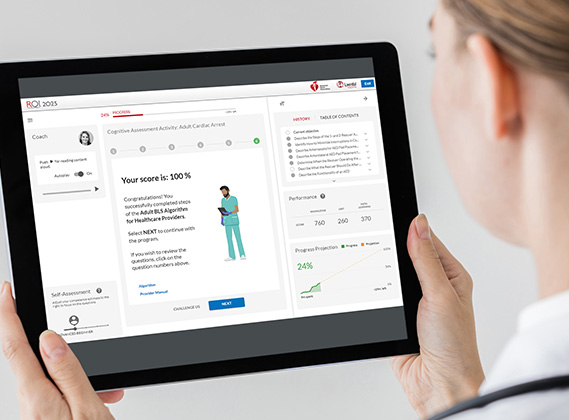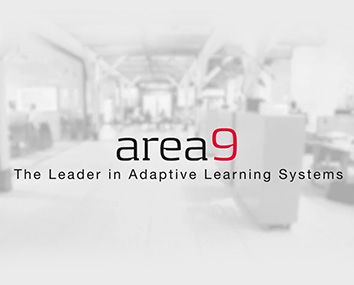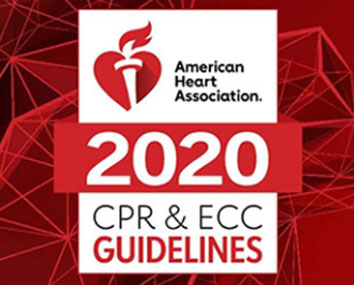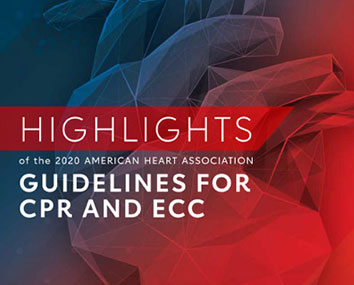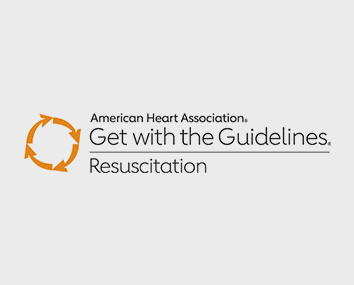RQI Programs
The Resuscitation Quality Improvement® (RQI®) program is the only data-driven, evidence-based program that verifies skills competence in healthcare workers and provide insights for organizational improvement. RQI satisfies the resuscitation requirements set forth by The Joint Commission and other accrediting agencies.
Modernized resuscitation training solutions
RQI programs aim to improve patient survival from sudden cardiac arrest. The low-dose, high-frequency method of deliberate quarterly practice with RQI has been proven to increase staff competence in resuscitation skills and knowledge.
Through a partnership between the American Heart Association and Laerdal Medical, RQI Partners was formed as the service provider for programs that combine the latest resuscitation science and simulation technology, while promoting the maintenance of high-quality CPR skills.
Over 1,453,000 healthcare providers have enrolled in the RQI program since 2018, resulting in millions of learners around the world ready to effectively respond to sudden cardiac arrest both inside and outside hospitals.
RQI is the only solution that protects your resuscitation program investment by offering a subscription-based model which eliminates turnover training costs by allowing you to reuse seats for staff replacement. The digital-first approach lets healthcare providers learn anywhere, anytime, with less time in a classroom and more time spent with patients.
Knowledge
Knowledge
The RQI Program meets the American Heart Association's (AHA) recommendation for high-quality CPR. Learners verify competence through a low-dose, high-frequency approach that features quarterly refreshers of hands-on skills and cognitive training. RQI 2025 learners can complete healthcare provider BLS, ALS and PALS certifications as well as responder certifications designed for ancillary and support staff.
Skills
Skills
The RQI Program features cognitive e-learning assessments every three months, with skills practice at the point of care. Learners complete deliberate, engaged practice at the RQI Simulation Station and receive real-time feedback to master essential skills. Verified competency is critical to our goal of improving survival outcomes and saving lives from cardiac arrest.
Analytics
Analytics
RQI collects and analyzes performance data from learners and presents aggregated results in an intuitive fashion. Administrators can use analytics to understand the current state of the RQI Program and focus on trends and areas for improvement. This data can optimize training efforts and ultimately help save more lives.
Verified Competence
Verified Competence
RQI verifies competence by collecting performance data. Research shows that self-reported confidence does not always correlate with demonstrated competence in high-quality CPR skills. RQI learners have improved their overall high-quality CPR scores as well as scores on specific skills. Adult compressions, adult ventilation and infant compressions scores all increased, demonstrating verified competence.
Clinical Data
Clinical Data
RQI Partners and the AHA's Get With The Guidelines® – Resuscitation (GWTG-R) program collect data to improve cardiac arrest outcomes globally. Data captured through the RQI learning platform enhances data in the GWTG-R clinical registry to evaluate trends and improve patient outcomes. This data also supports the development of future resuscitation guidelines.
Impact
Impact
CPR skills mastery with RQI promotes staff satisfaction and organizational quality improvement, often while saving money. Training empowers employees to confidently respond to cardiac arrest events by retaining their knowledge and skills over time. Data supports continuous quality improvement, and the digital delivery approach frequently cuts costs compared with instructor-led training.
Knowledge
Knowledge
The RQI Program meets the American Heart Association's (AHA) recommendation for high-quality CPR. Learners verify competence through a low-dose, high-frequency approach that features quarterly refreshers of hands-on skills and cognitive training. RQI 2025 learners can complete healthcare provider BLS, ALS and PALS certifications as well as responder certifications designed for ancillary and support staff.
Skills
Skills
The RQI Program features cognitive e-learning assessments every three months, with skills practice at the point of care. Learners complete deliberate, engaged practice at the RQI Simulation Station and receive real-time feedback to master essential skills. Verified competency is critical to our goal of improving survival outcomes and saving lives from cardiac arrest.
Analytics
Analytics
RQI collects and analyzes performance data from learners and presents aggregated results in an intuitive fashion. Administrators can use analytics to understand the current state of the RQI Program and focus on trends and areas for improvement. This data can optimize training efforts and ultimately help save more lives.
Verified Competence
Verified Competence
RQI verifies competence by collecting performance data. Research shows that self-reported confidence does not always correlate with demonstrated competence in high-quality CPR skills. RQI learners have improved their overall high-quality CPR scores as well as scores on specific skills. Adult compressions, adult ventilation and infant compressions scores all increased, demonstrating verified competence.
Clinical Data
Clinical Data
RQI Partners and the AHA's Get With The Guidelines® – Resuscitation (GWTG-R) program collect data to improve cardiac arrest outcomes globally. Data captured through the RQI learning platform enhances data in the GWTG-R clinical registry to evaluate trends and improve patient outcomes. This data also supports the development of future resuscitation guidelines.
Impact
Impact
CPR skills mastery with RQI promotes staff satisfaction and organizational quality improvement, often while saving money. Training empowers employees to confidently respond to cardiac arrest events by retaining their knowledge and skills over time. Data supports continuous quality improvement, and the digital delivery approach frequently cuts costs compared with instructor-led training.
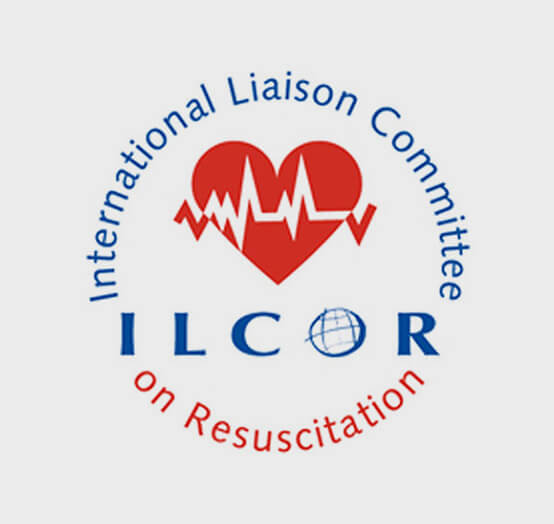
10 Steps Identified to Improve In-hospital Cardiac Arrest
To address a growing need to improve standards for responding to in-hospital cardiac arrest, the International Liaison Committee on Resuscitation has identified 10 steps that can lead to better patient outcomes and survival.
Foundational Programs
RQI Healthcare Provider
ACLS & PALS
RQI curricula offer the highest standard in CPR training. Digital programs combine online learning modules and simulation-based, hands-on skills training. RQI focuses on continued skills mastery with quarterly refresher sessions, a proven way to stave off skills decay.
Typically, in-classroom training averages 4-6 hours every 2 years, removing staff from the patient bedside. RQI requires 48% less training time and is self-administered quarterly.
RQI foundational programs include:
- Healthcare Provider for Basic Life Support (BLS). Verified competence in basic life support for adults, children and infants.
- Advanced Life Support (ALS). An extension of RQI Healthcare Provider that verifies competence of advanced life support and skills.
- Pediatric Advanced Life Support (PALS). An extension of RQI Healthcare Provider that verifies competence of pediatric advanced life support and skills.
- Responder for Hands-Only CPR. A program specially designed for non-clinical healthcare employees not directly involved in patient care.
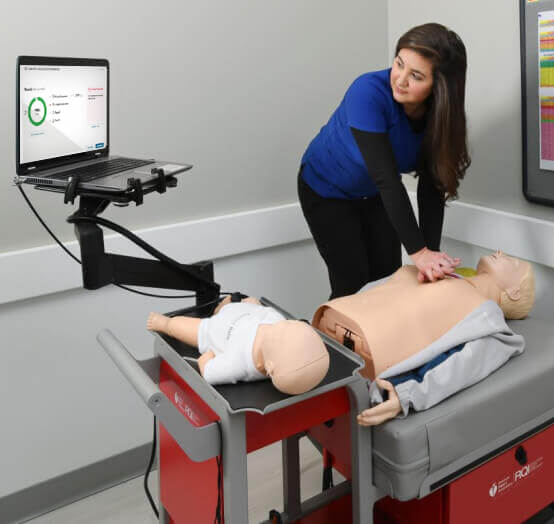
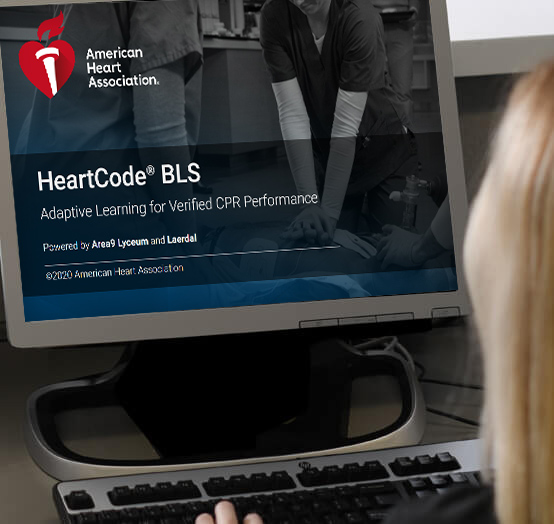
HeartCode
HeartCode and HeartCode Complete offer on-demand e-learning to meet learners on their own schedules. The programs use true adaptive learning to tailor the pace and training to each participant. HeartCode includes BLS, ALS and PALS and either instructor-led or simulation-based, hands-on skills training.
Neonatal Resuscitation Program (NRP)
The Neonatal Resuscitation Program (NRP) prepares healthcare providers and teams with an evidence-based approach to care for newborns in need. RQI Partners is the only organization offering NRP 8th Edition in partnership with the American Academy of Pediatrics. Choose from two delivery methods: NRP Instructor-Led and RQI for NRP.
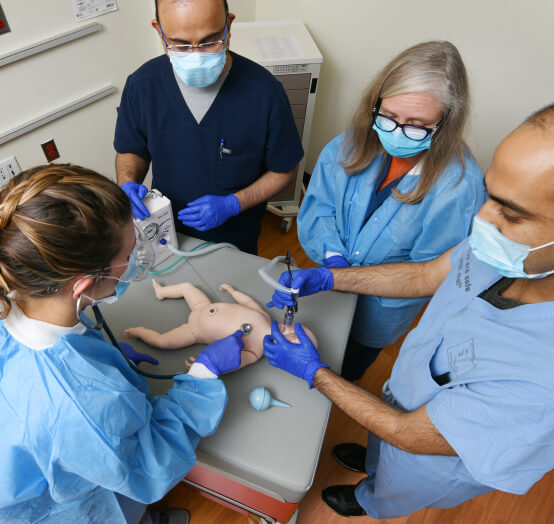
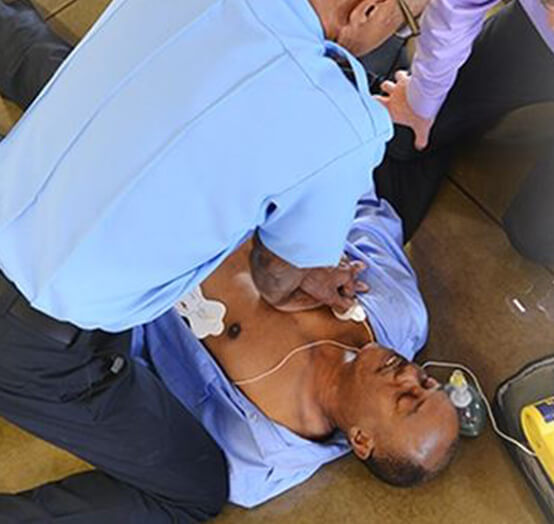
Additional Programs Offered
- RQI for Teams: Prehospital
- RQI Telecommunicator CPR
- RQI Go Program
Quarterly Education
How quarterly education boosts high-quality CPR
Research has found that CPR skills begin to decay just three months after training. Quarterly refreshers help learners maintain high-quality CPR skills. This keeps healthcare workers ready to respond and save lives. With RQI programs, learners get real-time visual and audio feedback and can complete the training on their schedules.
RQI Analytics
Understand. Focus. Improve.

RQI Analytics examines education performance data from participants and presents aggregate results in an intuitive, easy-to-digest fashion. RQI Analytics are designed to help you understand the current state of your RQI program and to use data to focus on trends and areas for improvement. Analytics for RQI allows you to gain valuable performance insight to further optimize training efforts, enhance your continuous quality improvement measures, and ultimately help save more lives.
Why Quarterly Education Matters
Our programs replace highly variable instructor-led training with consistent on-demand content that is adaptable to the Individual learner. Our solution includes objective, real time visual and audio feedback, reinforced by regular practice intervals to ensure knowledge retention.

The science behind the quality improvement methodology
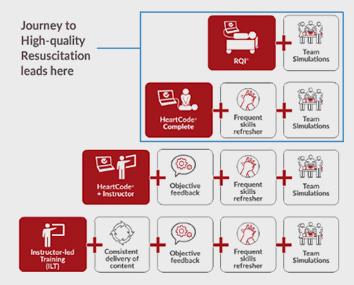
Journey to Quality
Consistent training puts learners on a journey toward mastery of high-quality CPR skills.
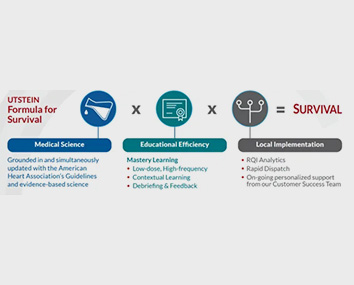
Utstein Formula for Survival
RQI supports each element with evidence-based, adaptive learning available through a digital platform.
True Adaptive Learning
Powered by Area9 Lyceum, courses adapt, tailoring content to the individual learner’s needs.
AHA Guidelines
Learning modules incorporate the latest AHA guidelines to ensure learners always have training in best practices.
AHA Reference Library
Stay up to date with access to resources on the latest resuscitation science and international guidelines.
Get With The Guidelines®-Resuscitation (GWTG®-R) Essentials.
Included with RQI, GWTG-R monitors trends and helps organizations improve outcomes from sudden cardiac arrest.
Continuing Education Commitment
RQI programs comprehensively address the competency-based requirements for accreditation as established by The Joint Commission, which are focused on competence, interactive verification of knowledge and skills and promoting a culture of safety.





